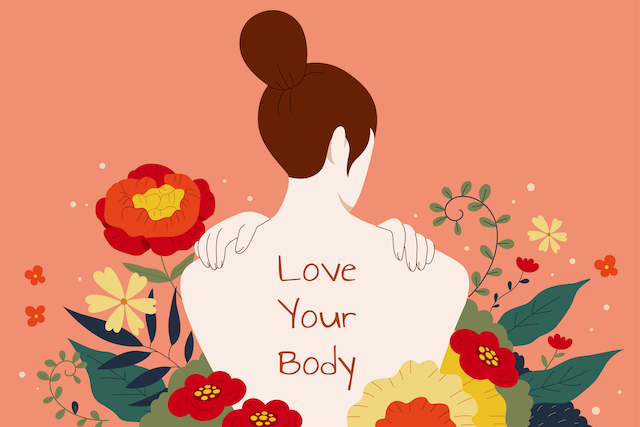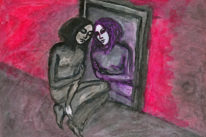
I was an award-winning personal trainer and nutrition and wellness coach for over eight years.
I also spent close to three decades struggling with my own weight and food issues—trying to “stick to” diets and/or healthy eating and lifestyle goals. And many years struggling with binge eating, bulimia, and (what I thought at the time was) an uncontrollable sugar addiction.
During the years I was working in the fitness and nutrition industry, whenever I’d get new clients, I’d find out what their health and fitness goals were, and I’d give them the perfect plan to help them get there.
And I made sure to remind them, it’s not a diet, it’s a lifestyle.
I did that because it’s what I learned to do. It’s what everyone does.
Because that’s what we’re taught—that eating, living, or being healthy requires us to make choices that others have told us are healthy and not do the things they’ve told us are unhealthy.
You know… the perfect healthy lifestyle that constantly reminds you to:
- Eat this, not that… or you’ll get sick, disease-ridden, and die early.
- Weigh this amount and not more…. or you’ll get sick, disease-ridden, and die early.
- Move this amount each day, in these ways… or you’ll get sick, disease-ridden, and die early.
- And… you’re not dieting. You’re just eating healthy. You’re creating a healthy lifestyle.
The perfect healthy eating and living plans constantly remind you that you must always be fighting, resisting, ignoring, and controlling yourself, your body, your hunger, and your cravings.
And always doing more, working harder, being disciplined, having motivation, building willpower, etc.
There’s a predictable formula for this supposedly “healthy” eating and living culture.
The formula insists that we conform to a socially acceptable, mythical, perfect body size and shape.
The formula treats our health as though it’s a future goal or accomplishment that we can only achieve later if we’re “good” now.
The formula must be followed with no excuses. When it’s not, the problem is you and your obedience, willpower, discipline, motivation, and commitment.
The formula is primarily concerned with optics rather than actual health. As long as we portray the “picture of health” and the behaviors we’re engaging in appear healthy, it doesn’t matter if the pressure, fear, and shame created by trying to stick to them are actually destroying us behind the scenes.
The formula requires us to trust the rules and advice of others over our own bodies.
It’s a mass-marketed, templated, “easy” model that allows no room for our own inner knowing, logic, self-trust, or personal power.
It’s easy to sell because it preys on fear and always sounds so shiny and tempting.
And this is what we’re taught it takes to eat and live healthy lives.
Multi-billion-dollar-a-year industries have taught us how to “get healthy.”
“Lose weight, feel great. Gain confidence. Get fit. Be healthy and happy. Live your best life.” But the unspoken truth is that it’s only “…as long as you follow our rules.”
But you’re not going to be able to stick to this plan, and when you can’t, you’re going to waste your entire life at war with yourself, promising to “get back on track.”
“On track,” of course, meaning doing all the things they say you’re supposed to.
It’s a paradigm that promotes constant fear and oppressive attempts to control ourselves and our bodies in order to follow one-size-fits-all, arbitrary prescriptions.
Nothing proves this more than how we’ve become so completely conned into believing the lie that healthy eating is hard work that requires willpower, discipline, commitment, and constant vigilance.
That’s horrible and not a healthy way to live at all!
We’ve been sold this message because it’s highly profitable for us to believe that we cannot trust ourselves and our own bodies and we must rely on others to tell us what to do.
And we’ve bought it—hook, line, and sinker.
But it forces us to go through life literally fighting with ourselves and our bodies, trying to follow their rules.
It forces us to live disembodied, detached, disconnected from, distrusting, and fully ignoring the wisdom of our own bodies and our own inner knowing.
Living in all that fear, disconnection, and distrust is so harmful.
For me, it resulted in bulimia, binge eating, anxiety disorder, panic attacks, chronic clinical depression, self-loathing, crippling shame, and what I was fully convinced was a sugar/food addiction so severe that I often went to bed at night afraid I would die in my sleep because I’d eaten so much.
I lived in a constant state of being completely consumed by not only the number on my scale but also fear and shame every time I “screwed up” and ate something “bad.” For decades of my life.
Eventually, my mental, emotional, and physical health deteriorated so badly that I recognized my only choice was to learn how to heal because I couldn’t keep living that way—it was killing me.
I finally recognized that my suffering was in large part the result of everything I was taught to do to maintain this supposedly healthy eating and lifestyle plan.
And all I really wanted was peace.
So I turned my back on it all.
I stopped exercising every day and started a little light, mindful walking and mobility work instead— whatever helped my body heal.
I released the need for my body to look a certain way or be a certain size and worked on healing my relationship with it instead of fighting to shrink, change, or control it.
I stopped trying to make myself “eat healthy” and allowed myself to not only eat whatever I wanted, whenever I wanted, but I even allowed myself to binge. I know that sounds crazy, but it’s truly the first step that helped me stop binge eating.
I shut out every single message I’d ever gotten in my life about what it takes to eat or live “healthy,” and I started reconnecting with myself so I could figure out what actually helped me best support my overall well-being, right now, in this moment.
I even eventually quit being a trainer and (traditional) nutrition and wellness coach.
I tuned out everything I knew about what “healthy” eating and living looks like, and instead I turned inward and started connecting with myself. I started getting to know myself, understanding the patterns that were driving all those unhealthy choices in the first place and learning to change those.
I started asking, how do I feel right now? How do I want to feel? What do I need (mentally, emotionally, or physically) in order to bridge the gap between the two, if there is one?
It’s changed everything in the most glorious ways.
I haven’t binged in many years. That’s a pattern that simply no longer exists in me.
I’m not scared of and don’t feel addicted to or out of control around sugar (or any food) anymore.
Food no longer controls me… not even sugar.
I crave things that help me feel my best, including water, which I never used to drink before.
I treat (and speak to) myself and my body with love and kindness.
All of the “unhealthy” choices we make, all the unhealthy things we do to ourselves—even binge eating and supposed “sugar addictions”—it’s all merely the result of our conditioning. The stuff going on inside us.
My external world, my lifestyle, my unhealthy choices, they were all symptoms of what was going on inside me—all the self-abuse I heaped on myself, ironically, because I couldn’t “stick to” a healthy living plan.
When I changed that, when I stopped focusing on what I was doing and started changing my inner world, who I was being, my outer world (and the choices I was making for myself and my body) naturally changed.
Healthy eating and living should never be the goal; they’re the result of how we’re being.
Because here’s the thing: your body doesn’t care about the “health” goals you hope to meet in the future.
It only knows what it needs right now, in this moment, and whether you’re making choices that help support that or not.
If you’re trying to make yourself be consistent with some plan that’s supposed to help you reach some goal at a later date, you are, by definition, disconnected from your body and what it’s trying to tell you it actually needs right now.
That’s a recipe for not making healthy choices and ignoring your body’s cues and messages.
Supporting our health requires supporting our overall well-being, and we can only do that when we’re deeply connected to ourselves through what I call wholehearted being: being present, connected, curious, and intentional about our unique moment-to-moment needs and loving ourselves and our bodies enough to want to honor them.
When you do that, making choices that best support yourself and your body right now becomes the natural result.
Not some arbitrary goal that you can’t ever stay consistent enough to reach.
If you’re reading this and can relate to any parts of my struggles with weight, overeating, binge eating, and sugar addiction, I want you to know that you, at your core, instinctively know what you and your body need to feel and live your best.
You’ve just been conditioned out of that inner knowing after a lifetime of learning from everyone else that the only way to be healthy is to control yourself and your body and follow their advice instead of trusting your own inner knowing.
With wholehearted being, I’ve gone from binge eating, bulimia, obsessive and compulsive thoughts and patterns around food and exercise, self and body hate and distrust…
…to kindness, compassion, self and body love and trust, and learning to genuinely want to eat in ways that best support and nurture me.
A New Path to Healthy Eating and Living
Healthy eating and living through wholehearted being helps you build a foundation rooted firmly in your own self-love, trust, and worthiness because how we feel about ourselves impacts every aspect of our lives, including how we treat ourselves and our bodies.
From there, you learn to make choices for yourself and your body through four main pillars of being:
Present in this moment and in your body so you can break the conditioning that drives unhealthy behaviors
Connected to your inner world—your thoughts, feelings, and communication from your body about what you need
Curious about your inner experiences in this moment, with gentle awareness, self-compassion, and non-judgment
Intentional with your thoughts, behaviors, and responses—intentionally choosing from kindness, gratitude, and love
This process is incredibly powerful because it does two things that are required for lasting change:
1.It helps you learn to love, trust, and value yourself enough to care how you treat your body.
2. It allows you to put space between your triggers and the conditioned, autopilot behaviors that drive unhealthy choices in the first place. This allows you to get to know yourself, your patterns, and your needs and learn new tools and practices that better support your overall well-being. Tools and practices that also help you learn to better understand and nurture, not only your physical needs, but your mental and emotional needs as well. And that’s vital because our thoughts and emotions are major components of our overall well-being. They drive the choices we make.
It’s a powerful and simple process but not an easy one. It takes courage to relearn to trust yourself with food, to learn new ways of being, and it takes a lot of practice, repetition, and support, but it’s so very worth it.
After eight years in the fitness, nutrition, and wellness industry (and almost thirty years of dieting), I finally got healthy and broke my sugar addiction by choosing to start focusing on my life instead of my weight or food choices.
By learning to tune out the external messages trying to tell me what I “should” eat or do and turn inward to start making choices for myself that best nurture my whole being, moment to moment—choices that are grounded in love, self and body trust, connection, and kindness.
And it’s changed everything.
About Roni Davis
Drawing on her own healing process plus over a decade of professional knowledge, education, and experience, E-CET founder Roni Davis guides women through the process of uncovering and changing the thought and behavior patterns that cause weight and food struggles. Her clients break unhealthy eating habits and heal their relationships with food and their bodies while learning to approach their overall well-being from a place of connection, self-trust, compassion, and love. Learn more with her free Why We Eat video series.
- Web |
- More Posts













 Though I run this site, it is not mine. It's ours. It's not about me. It's about us. Your stories and your wisdom are just as meaningful as mine.
Though I run this site, it is not mine. It's ours. It's not about me. It's about us. Your stories and your wisdom are just as meaningful as mine.
A very well written article😊👍! I definitely can relate to this. I’m a plus sized woman who has heard about the “importance” of being a size six or smaller for most of my life 🙄.
I admit I was tempted to want to take the advice I heard but I quickly learned my body is not made to be that way. It will always be a size twelve and fourteen – depending on the designer.
My work as a dog sitter keeps me fit and as far as my diet goes: everything in moderation.
The fitness industry means well – I’m not knocking it, far from it – however the only one who truly knows what is best for us is ourselves.